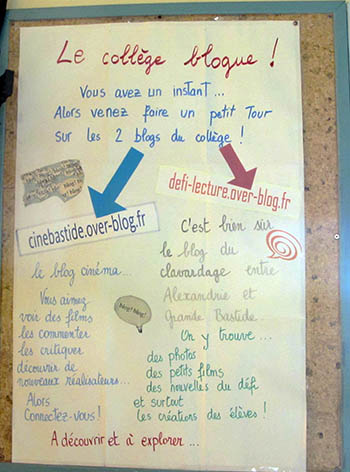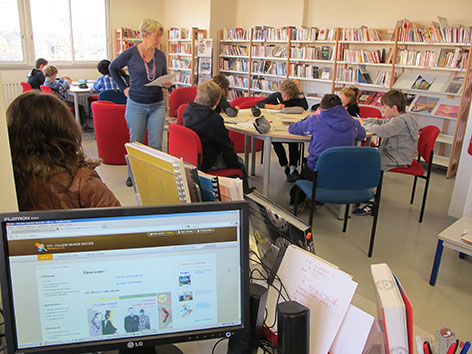Anne Bresard is a school librarian who teaches in Grande Bastide, a middle school of Marseille. She is also the contact person for digital issues in the school. Since 2005, she has been involved in the exchange projects with schools in Alexandria that have been possible through the implementation of digital technology using chat meetings named « Clavardages » that happened through the school year.
What have been the major changes in the use of digital tools by school librarians ?
In French National Education we have been talking and using digital tools for 20 years ! What are the main changes today ? First of all, today the equipment performance has improved a lot. In the beginning, we had a lot of trouble using this tool, because of many inefficiencies in equipments, connection, network… Many problems have been fixed (we have enough computers in the library, Internet connection is fast enough to load resources like images, videos…) and finally digital tools are taken seriously in shool libraries.
When digital technology came up, my initial reaction was to use it as a database to manage the book collection in a quicker simpler, and more flexible way and to improve access.
Gradually, as digital technology has become ever more present in children and parents daily lives, it has also arrived in education, though there is still resistance among teachers. As a school librarian, we have a key role to play in two differents center points. The first one is to acquire digital resources for the students, which means to select resources with adequate contents. Then we should ensure that they can be understood and used.
The second area, had great importance these past two years, is our role as a digital person on social networks : which power, position, status are you holding ? Students should ask themselves the right questions and learn to construct their own opinions.
For some time, we were invited to accompany Internet research, by encouraging student reflection. For instance, we used reading grid for websites : who created the website ? what is his role ? Can we trust him ? … Internet was considered as a jungle in which you should enter with special tools. Today, these questions are less important, because at the end, I consider that generally you can find quite reliable information. Most often, the pupils are visiting wikipedia. The encyclopedia works now well because more and more people are publishing and that there is self regulation. Teachers are less focused on the issue of the reliability of the data.
Whereas the fact that the students have become authors on Internet raises the question of their digital identity. They publish, they suscribe to feeds, they have their own channel on youtube. Here, I believe, our role is to encourage them to have a reflexive attitude, to ask themselves the right questions, to become aware that they can wear different hats on Internet, to make a clear distinction between your identity and the avatars… They realize that other people also have different hats according to where and when they publish. At the moment, it seems to me a very important issue. We and a French teacher are working together on this point. The students watch movies and then they publish texts related to the movies on a blog.
What concepts are taught to the students, at the middle school ?
The school librarian teaching follow a linear progression from simple to complex. For instance, the first year is focused on the properties of the document, different kind of documents and the tools utilized. During the second year, the students approach the legislation, their rights and duties on internet. The third year is reserved to the research : how can they conduct a research, with its different stages? Finally the last year tackle the issue of digital identities : what do I publish ? What kinds of electronic footprint do I leave when I use Internet ?
What kind of collaboration do school librarians have with other teachers ?
Some school librarians provide more than 15 hours lessons by week and meet almost all grades. I consider my role as a case-by-case support to the teachers according to their needs. That’s why, I often take action at the stage of documentary research to prepare a presentation. I often work with the students in the last year of middle school, because they are in charge of a part of the biology program and should communicate the lesson by themselves to the other pupils. I taught them brainstorming techniques, the search by keywords, and presentation results (index, legend, structure or plan, etc).
I introduce the concept of copyright, and rights associated related to a work in collaboration with a French teacher. We also teach them to pay attention to the style when they publish : written expression, graphic design, clarity… They often think « I work for my teacher », so we encourage them to think « I will write for the public ».
School librarians also have a resource role. I subscribe to mailing lists, like the Fidel Navamuel’s feed which focuses on collaborative tools. Each time I locate something interesting, I integrate in my own collection. I often use business tools which I find in education tools. For instance, when we did a brainstorming I used a digital tool of post it notes on a digital board. Sometimes, we use on line mind maps. I never start from the tools but from their desire and the teachers projects.
Some of my colleagues work a lot to share information, like the exemple of the librarian teacher from Fraissinet, school, Florence Marcadent. Many teachers share their experience, their is a lot of mutualisation. In this field, there is no problem of lack of ideas. More and more fluid and intuitive tools can be used totaly online. They don’t require much time to be understood. Padlet is an example. On this visual space, pupils can publish in a collaborative manner. Internet allows us to share. This is the main message that I wish to convey to my students : searching and then giving back.
For more information, visit:
- the school website :
- the portal of the school library website :
- Défi lecture blog, not fed any more. For 9 years the blog has highlighted the student exchanges between Grande Bastide and schools in Alexandria.




